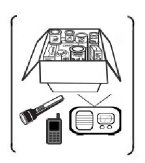
No matter what the form of the disaster, no matter where we live, preparation is very important. And, the responsibility for preparedness rests on you.
Planning in advance for an emergency will help you to take care of yourself and your loved ones. The following are suggestions and links to sites that are designed to assist you with your personal preparedness.
SUGGESTIONS FOR PERSONAL PREPAREDNESS PLANNING
Put Together 2 Emergency Supply Kits.
One should contain everything needed to stay where you are and make it on your own. The other should be a light-weight, smaller version you can take with you if you have to get away.
Make a Family Communication Plan.
You and your family may not be together when an emergency strikes, so your Family Communication Plan should include plans on how to contact one another in different situations

Organize Important Paperwork.
Organize your important legal, financial, and insurance paperwork. When you have six feet of water in your living room is not the time to wonder whether or not you have insurance for this kind of thing.
Make a Checklist for Service Animals and Pets.
You love them and rely on them. In an emergency, they will also need you.
Make Arrangements for a Support Network.
In the event of a serious disaster, you may need assistance from your personal support network. Arrangements made prior to an emergency will be crucial.
CHECKLIST OF THINGS TO HAVE, TO KNOW, AND TO DO
The following suggestions/tips are offered in no particular order:
- Conduct an ability self-assessment
- Collect “carry-with-you” supplies to keep with you at all times
- Collect disability-related supplies for emergency kits
- Maintain a 7-day supply of essential medications
- Keep important equipment and assistive devices in a consistent, convenient and secured place
- Write out instructions for things you will need help with in an emergency
- Customize an emergency health information card – include name, address, phone #, blood type, physicians names and telephone #s, medications, allergies, equipment needs, communication needs, insurance carrier & ID #, emergency contacts, etc. – Keep copies in wallet, purse, and emergency supply kits
- Make an emergency contact list
- Establish a personal support network
- Make arrangements, prior to an emergency, for your support network to immediately check on you after a disaster
- Make copies of important keys for your support network
- Show your support network where you have your emergency supplies and important equipment and assi
stive devices - Notify your support network when you are going out of town and when you will return. And have them do the same.
- Keep emergency documents in a consistent, convenient and secured place
- Make copies of important documents and give to your support network
- If you have pets and/or service animals, don’t forget to make plans for them as well. They will also need food and supplies in an emergency
Use these links to be prepared in case of an emergency:
FEMA Resources
- FEMA offers a mobile app for alerts from the National Weather Service, safety reminders, locating open shelters and where to talk to FEMA: Download and install the FEMA App, available for Apple, Android, and Blackberry mobile devices.
- Persons with Disabilities
- Brochures for all Emergency Services
- Pets – FEMA doesn’t have specific advice for service animals
- What’s you Plan? Getting it Right, My Personal Plan on Emergency Preparedness
- Recovery Resources
New York City offers Guides and Resources in many languages
The Red Cross covers situations from chemical emergency to winter storms
The Red Cross takes you through three steps to get ready and plan
SAMSHA provides disaster and distress information.
SAMHSA’s Disaster Distress Helpline provides 24/7, 365-day-a-year crisis counseling and support to people experiencing emotional distress related to natural or human-caused disasters. Call 1-800-985-5990 or text TalkWithUs to 66746 or Hablanos to 1-787-339-2663, for Spanish, to connect with a trained crisis counselor
Callers to the helpline can connect with counselors in over 100 different languages.
Text or Hablanos to 1-787-339-2663 for Spanish to connect with a trained crisis counselor.
